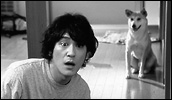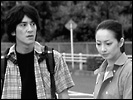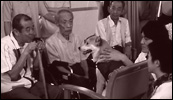Walking with the Dog
- Year
- 2004
- Original title
- Inu to Arukeba Chirori to Tamura
- Japanese title
- 犬と歩けば チロリとタムラ
- Director
- Cast
- Running time
- 105 minutes
- Published
- 1 November 2004



by Jasper Sharp
2004 was the Year of the Dog as far as Japanese cinema was concerned. March saw the release of Quill, coming from no less unlikely director than Yoichi Sai, better known for gory thrillers such as MARKS or biting social satires like All Under the Moon and Doing Time. A major hit in Japan, Sai's adaptation of the popular novel Modo-ken Kuiru no Issei [trans: Guide Dog Quill's Life] about the training of the charming dog for the blind of the title also made it to the number one position on the box office chart when it opened in Hong Kong, proving that a predilection for tales about cute fluffy animals is not solely the reserve of the Japanese.
Following in the wake of both Quill and last year's high-school dog drama Sayonara Kuro (dir: Joji Matsuoka, 2003), Walking with the Dog also comes from an improbable source. Debuting with the heartfelt tale of marital miscommunication Okaeri, and following it up with the powerful but flawed Not Forgotten, a film woefully overlooked both inside and outside of Japan, director Makoto Shinozaki has recently been keeping himself busy overseeing the madcap antics of the omnibus series Cop Festival (Deka Matsuri, 2003-04). One of the leading lights of the nation's independent film scene, he is perhaps one of the last people one would have expected to be harbouring a sentimental dog story inside him.
Yasuyuki (Tanaka) still hasn't come to terms with the fact that he is splitting up with his pristine but frosty girlfriend Miwa (the stunning Ryo of Gemini and Bright Future). A likeable enough chap, he is still a bit clueless when it comes to understanding her emotional needs, and with her mother terminal ill with only six months left of her life, it initially seems that Miwa's decision to move out of the apartment they have shared for several years and spend some time back with her family without him is only a temporary one. Coming back from the convenience store the day before they are set to part, he comes across an abandoned dog and, kind-hearted guy that he is, stops to feed it. The dog, whom he names Tamura, after a kid he was at school with due to their similar toilet habits, immediately takes a shine to Yasuyuki (more specifically, his leg) and follows him back to the apartment block.
Come the following morning when it is time to move on, Yasuyuki still hasn't organised a place to stay, and his newly-married pregnant sister Ryoko (Yoshimura) and her husband Tsuyoshi (Katagiri) are adamant that he doesn't spend so much as an evening on their couch. The dog, however, is still there, waiting patiently for Yasuyuki on the tarmac outside the apartment. With both man and dog alike finding themselves deserted and living like vagrants with neither a roof over their heads nor any real sense of purpose in life, they are by chance alerted by a TV program about an organisation that trains "Therapy Dogs" used to comfort the elderly and the infirm. Sweet-natured Tamura seems to be an ideal candidate for the job, and with Yasuyuki acting as his trainer, his natural talent at comforting the sick might just prove instrumental in getting back in Miwa's good books by both making her mother's final months on the planet a little more bearable, and building a bridge between Miwa and her sulky, withdrawn sister Miki (Fujita).
Shinozaki's latest is certainly one of the better movies of its kind, probably because it is not so much focused on its canine characters as it is on the emotional worlds of the humans that surround them. Even though Walking with the Dog sees Shinozaki working from a script written by someone else (Kei Shichiri, yet another figure emerging from the ghetto of erotic straight-to-video V-cinema), the genuine sense of humour and charm the director brings to the film is all his own. As usual, the director's talents at drawing out his characters through a subtle use of nuanced humour, physical gestures, and facial expressions rather than dialogue are well in evidence here.
It would have been easy, of course, to depict Tamura's bouncy presence brightening the lives of all he comes into contact with by means of a quick reaction shot and a Lassie-like yelp, but thankfully the script never over-sanitises the cuteness appeal of the dogs. In one memorable scene, as Yasuyuki kips down in his abandoned apartment, he is awakened the next morning by a spray of dog pee and a large, glistening turd lying next to his head.
The very decision to shed light on the real-life subject of Therapy Dogs brings a degree of social relevance to Tamura's energising presence without ever seeming too didactic. Both of the main dog characters, Chirori and Peace, are played by real-life Therapy Dogs accompanied by their real-life dog trainers. Also playing under his own name is the real-life Therapy Dog advocate and blues singer, Tooru Oki, whilst the appearance of Tomio Aoki, a regular feature in Shinozaki's previous films, as a bed-bound geriatric whose final moments are brightened by the affections of Tamura, is also far more resonant when one remembers that this was the veteran actor's final screen appearance before tragically passing away on January 24, 2004.
Animal movies may prove a tough sell to certain audience demographics, but though Walking with the Dog hardly repeated the resounding success of Quill at the domestic box office, it still managed to pick up the Best Film Award at this year's Shanghai International Film Festival. The pace takes a bit of a dip in the final quarter, it's true, but on balance Walking the Dog is a nice, warm-hearted movie with the power to squeeze a tear from even the most cynical eyes.